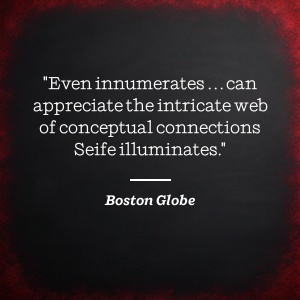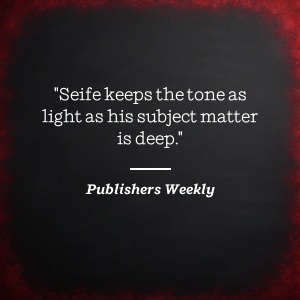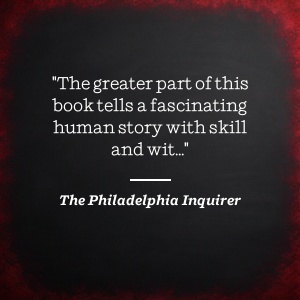معلومات عنا
حقوق الطبع والنشر © 2024 Desertcart Holdings Limited


📖 Zero: Where Nothing Becomes Everything!
Zero: The Biography of a Dangerous Idea explores the profound implications of the number zero, tracing its historical journey from ancient civilizations to its pivotal role in modern mathematics and philosophy. This engaging narrative reveals how zero has challenged perceptions and transformed cultures, making it a must-read for anyone interested in the intersection of numbers and ideas.



| Best Sellers Rank | #60,160 in Books ( See Top 100 in Books ) #26 in Mathematics History #36 in Popular & Elementary Arithmetic (Books) #183 in History & Philosophy of Science (Books) |
| Customer Reviews | 4.5 4.5 out of 5 stars (1,320) |
| Dimensions | 8 x 5.1 x 0.9 inches |
| Grade level | 12 and up |
| ISBN-10 | 0140296476 |
| ISBN-13 | 978-0140296471 |
| Item Weight | 6.4 ounces |
| Language | English |
| Print length | 272 pages |
| Publication date | September 1, 2000 |
| Publisher | Penguin Books |
| Reading age | 18 years and up |
G**D
Nothing... Something to get excited about
I'll admit, writing a book about nothing and making it exciting is probably a challenging thing to do. This is going to be a rather odd thing to bring up at the start of the review, but I have to ask did people read a different book than I did? Seriously, I read through just about every negative review and the points made against the book are barely in the book I read. If anything, they focus in on a minor detail, interpret it wrong, and then give the book a one star. I digress, let me get to the review and then I may go over some points to refute. This book focuses on the history of Zero for the most part. In there it touches upon historical moments in mathematics and later in physics as it gets to the modern scientific era. I personally found the research on the early history quite on point and very fun to read (there's a lengthy bibliography at the end if you feel the need to see his words backed up). The sensational writing didn't bother me at all, because I realize the relationship between the title and the style. Seife is trying to make nothing exciting! If you didn't get that point or got annoyed with that style then you missed out on a really fun read. The author tried to include fairly random historical anecdotes about the people discussed to lighten the mood in the book. I thought these were fun additions and interesting to read as well. Overall the book is written in decently easy to understand language. I have a fairly decent mathematical background and I didn't feel I really needed to know everything to read the first half of the book. However, when Seife starts delving into concepts like Calculus and Set Theory I think knowing how to do calculus was definitely a help in understanding this section. If you're more of a lay reader and more interested in the history than the math then this book really might be a bad choice. The first part is absolutely fascinating, but it does get confusing towards the end, especially when he starts delving into Quantum Theory and Particle Physics. One aspect on the section of early history that I found particularly fascinating was the relation of zero to philosophy. The ancients were heavily influenced by beliefs and philosophy so it's not much of a stretch to think this influence stretched beyond just those subjects and into math and science. So when Pythagoras and Aristotle reject notions of the void philosophically it's reasonable to assume they would find such notions nonsense mathematically. For a long time, and still today, Math is merely a representation of the world we see and observe. They didn't observe voids or vacuum's during Aristotle's time so naturally they wouldn't exactly latch onto it as a real possibility. One thing that really fascinated me was the possible hindrance philosophy and belief (or religion) had in holding back mankind's ability to progress mathematically. The main reason that zero didn't make it into the western world probably had more to do with the stranglehold the Romans put on the people than with their unwilling to believe in the void or infinity, which is also why it was trade that finally used zero. However, there were intellectuals alive and breathing during the Dark Ages and a lot of their hindrance to accept concepts like zero was philosophical. The Church had adopted Aristotle's model of the universe and it was blatantly wrong. (This book does not say Aristotle is at fault for holding back people philosophically, it merely says his view/model, that the Earth is the center of the universe, is wrong. Which it is.) However, the rising power of the Catholic Church adopted his explanation and said it was a fact and back then their word was law. Once mathematics and science came across discrepancies in that proof then Church asserted its power and only tried to tighten its grip on those communities until people revolted against it. I'm not saying zero is the reason we got out of the Dark Ages, but it didn't hurt us any! It probably helped us a lot more in the long run. My point in bringing this up is that things like belief and philosophy can hinder progress in fields like the sciences. (These are not beliefs, as in making assumptions about testable criteria by the way.) It seems to make more sense, that if you must derive some divine notion, you would interpret the data, not try to fit the data into a preconceived belief. Thus belief would interpret the math and math would not interpret the belief. The ancients had this backwards for a long time, which I think that's a major factor and this book touches upon that. As I mentioned above the book can change gears into something very complicated. I think this is kind of the downfall of this book for some people because the confusing explanations at the end leave them on a low note. As the book progressed and got beyond my mathematical understanding I found the explanations a lot more confusing. When it finally got out of the confusing areas I think it picked up again during the sections on the expansion of the universe. I enjoyed the parts of Zero Point energy, but I'm not entirely sure it's written in a fashion that is easily understood. Seife makes comments in a very historical manner and I think that really confuses people at times. Such as one reviewer complained that the books information is outdated on Vacuums and concepts like limitless energy. However, this book does touch on that subject during its discussion of Zero Point energy, maybe it was merely presented in a way that confused readers? I'm not entirely sure; I didn't personally feel confused until he started talking about Set Theory, which I clearly need to brush up on. In the end I simply loved this book. I tore through it in a mere three days and I'm a pretty slow reader. I personally didn't mind the sensationalizing of zero to fairly emphatic levels. This is a book about nothing after all and you might as well make it sound really exciting! Maybe there should've been more exclamation points so we can see how impressive the author's thoughts really are! Anyway I had fun with this book, but I wouldn't recommend it to people that haven't made it beyond calculus or else the second half might get a little confusing. Previously understanding Einstein's work would be a bonus to getting through this book as well. Other than that the first half is absolutely fascinating and I feel I walked away with more knowledge than I went in even if the book repeated a lot of things I already knew. Overall Rating: 4.5 out of 5
A**S
A great history of math from Pythagorean geometry to String Theory
Charles Seife with three degrees in math and journalism from Ivy League schools is a very talented science writer. This is the first book of five he wrote on math and sciences. This entertaining book covers much of the history of math. Among many other things, it is an insightful revisionist look at the Greek legacy. The Greeks left a formidable legacy in geometry but held back math for over a millennium. This is because they treated numbers almost exclusively as geometric shapes. They fanatically rejected basic mathematical concepts that did not fit a geometric framework such as: negative numbers, irrational numbers, the concepts of Zero and infinity. This rendered them innumerate outside geometry. They fanatically rejected those concepts to protect Pythagorean geometry. Several Greek mathematicians daring to explore those concepts paid with their lives. Pythagoras, leader of a mathematically oriented cult, sentenced one such heretic mathematician to death. Given the Greeks mentioned gaps, they had no way of developing algebra and calculus which are the foundation of our information-algorithmic world. Obviously, calculus includes both algebra and geometry. So, geometry is not outdated; but, it is just a subset of mathematics. Aristotelian physics was so influential in the West that it set it back relative to other civilizations for over a millennium. Archimedes just a century after Aristotle came close to freeing the West from the Greeks shackling math legacy. He was on the verge of discovering calculus principles when he was killed by a Roman soldier. Had it not been for this inadvertent killing, calculus could have been discovered 1800 years before Newton. Where would we be now 1800 years into our own future? Indians will take the leap into modern mathematics by integrating Greek geometry and Babylonian mathematics (they invented zero). Indian texts from 476 AD indicate that Indians had our modern numerals down. They passed on their knowledge to the Arabs who did make huge contribution to mathematics such as Al-Khowarizmi who developed algebra in the 800s. In turn, the Arabs transferred their number system to us. So, we call it Arabic numerals instead of Indian numerals. One of the Arabs great contributions was to reject the Aristotelian world entirely and therefore allow their math discoveries to flourish. However, the Christian Church will prevent early adoption of Arabic math for centuries. Eventually, the West catches up with the Renaissance and Scientific Revolution. It will take Fibonacci, an Italian mathematician, to reintroduce Arabic numerals including the concept of Zero to the West in the 1200s. In the 1400s Brunelleschi, an Italian architect and painter, will introduce the concept of Zero in painting (convergent lines to a single point creating perspective for the first time). Copernicus uncovers that the Earth revolves around the Sun in the 1500s (utmost rejection of the Aristotelian world). The 1600s will account for an explosion in Western mathematics. Descartes will create analytical geometry tying geometry and algebra (any shape can be described by an equation). Soon after, Pascal introduces probability theory. And, soon after Newton and Leibniz introduce independently calculus. Seife credits Newton with coming up with the concept first, but Leibniz with coming up with the better concept. Today's calculus actually uses Leibniz structure (not Newton). Seife tackles complex mathematics starting with chapter 6. Seife explores the power of zero and its counterpart: infinity. Seife explains the development of projective geometry, imaginary numbers (i.e. square root of -1), complex numbers (who have a real and an imaginary component), Rieman sphere, singularities (numbers where equations break down), infinities that can be additive and subtractive, and Set Theory. Seife moves on to Quantum Mechanics and the Theory of Relativity. He explores the tension between the two that relate to the different impact that Zero has on both theories. Seife while explaining those theories also covers the Heisenberg Principle, Black Holes and Escape Velocity, Wormhole, the Pauli Exclusion, and the Chadrasekhar Limit. Seife moves on to String Theory as an effort to reconcile Quantum mechanics and the Theory of Relativity. Oddly enough, String theory works by getting rid of Zero that cause both theories to be inconsistent with each other. String Theory represents the hope of developing a Theory of Everything that would once and for all reconcile the Theory of Relativity and Quantum Mechanics. However, String Theory has major problems besides getting rid of Zero. It requires a 10-dimensional space or 6 more than the Theory of Relativity (Time is the 4th dimension). Those 6 dimensions have no meaning. And, Strings will never be observable. Therefore, many scientists don't consider it science.
J**Z
A Truely Entertaining Read
In simple summary, this is one of the most entertaining books I've ever read. It takes the reader through a long, troublesome, history of zero. The author has definitely done his research, and the book remains entertaining throughout. The only drawback is that he gets a bit off topic sometimes, and it feels like he's trying to fill up a bit of remaining space. The 'padding' is still very entertaining, however. There is much criticism about how the author uses non-standard language throughout the book. I think those folks are missing the point. This is not supposed to be a book used to teach from, nor is it meant to sit among other mathematical/scientific journals. The book is intended as journalism, and nothing more. That means you are meant to read it, enjoy it, and put it back down. Any confusion can be solved by doing actual research in the field, if the topics interest you so. Note: The "proof" he presents that one reviewer claimed was a proof that it was better to be Christian than atheist was just an example of the church's acceptance of infinity, nothing more. Pascal brought about the church's acceptance of a concept that mathematicians needed, Seife simply explained how he did it.
H**L
Good read and strange facts in there about ZERO.
K**R
I was looking for a history book, and it got to thecnical for my liking. Not really an easy read.
D**S
Though main focus of the book is Zero - how humankind reached to its concept, its importance in solving crises of concepts faced by scientific society, the book vividly depicts how it helped development of science afterwards and its scope in future. The language is lucid and the way of story telling is captivating. This book is not written for scientists but for the general reader. Persons who are afraid of mathematics, I am sure, also will enjoy this book.
A**I
As the title suggests ( and it's written by a mathematician so, although filled with humour, it's very sticking to the point ) this is the biography of how Zero went from non-being important to becoming ( at least according to the author ) an all-important matter. Gotta warn you though: the guy takes this Zero thing very seriously, as far as making fun of ( almost ) the whole of humanity, including his former mathematician colleagues.
Z**H
The way the book ties the concept of Zero across so many disciplines; cultures, discoveries- etc. Fascinating book _ One of a kind
ترست بايلوت
منذ 3 أسابيع
منذ 3 أيام